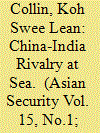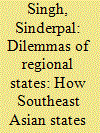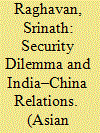| Srl | Item |
| 1 |
ID:
164694


|
|
|
|
|
| Summary/Abstract |
The Sino-Indian rivalry features an increasingly prominent maritime dimension amidst the countries’ naval buildups and deployments in the Indian Ocean Region (IOR) and Western Pacific. This study finds that the patterns of naval buildup and nature of the seas as an ambiguous, international medium do not necessarily shape mutual perceptions between China and India as pure security seekers. India’s concerns about China’s IOR forays revolve around its expanding bluewater naval capabilities, especially submarines, and port access. Beijing is wary of New Delhi’s reach into the Western Pacific and role within a perceived US-led containment scheme that allows it to leverage on partners’ bluewater assets. While war remains a remote prospect, this Sino-Indian rivalry at sea – extending from unresolved terrestrial political problems – looks set to persist.
|
|
|
|
|
|
|
|
|
|
|
|
|
|
|
|
| 2 |
ID:
164696


|
|
|
|
|
| Summary/Abstract |
This article examines contemporary perceptions and the corresponding responses of Southeast Asian states vis-à-vis India–China maritime competition. Specifically, it examines the cases of Singapore, Vietnam, and the Philippines. These countries provide useful cross-comparisons as, bilaterally, all three states relate uniquely to China and the maritime disputes in the South China Sea on the basis of two structural conditions – their formal security relationship with the US and whether they are a claimant state in the South China Sea dispute. The link between the range afforded by these three cases and the manner in which it drives their perceptions towards India–China maritime competition forms the core of this article. These three countries perceive differing levels of threat from China and have chosen a range of external balancing strategies to deal with these perceived threats. The nature of US–China and India–China security competition, the latter specifically in the maritime realm, structures the external balancing strategies they have pursued. There are, this article argues, important links between US–China and India–China strategic competition in structuring the external balancing strategies these countries pursue.
|
|
|
|
|
|
|
|
|
|
|
|
|
|
|
|
| 3 |
ID:
164695


|
|
|
|
|
| Summary/Abstract |
This article argues that China’s rise and its growing military power have intensified the Sino-Indian security dilemma. For a long time after the 1962 war, India’s military posture along the India–China border was mostly defensive in nature and could be characterized as imposing “deterrence by denial.” However, over the last decade, China’s growth trajectory coupled with rapid modernization of its military called into question the efficacy of this approach. India now feels much more vulnerable to China’s increasing military power both on the land frontier as well as in the maritime domain. The increasing intensity of this security dilemma has informed a consequent shift in India’s military strategy vis-à-vis China to one of “deterrence by punishment.” Theoretically, this article examines how changes in the severity of a security dilemma can lead to changes in military strategy. While doing so it explains India’s current military strategy to deal with the challenge posed by China.
|
|
|
|
|
|
|
|
|
|
|
|
|
|
|
|
| 4 |
ID:
164693


|
|
|
|
|
| Summary/Abstract |
This introduction explains the rationale for this special issue of Asian Security. It begins with a short discussion about the relevance and the utility of the term “security dilemma” in international relations. The concept, which emerged during the Cold War, has since been used extensively to describe India-China relations. This special issue attempts to add to our understanding of the India–China relationship as well as to contribute to enriching the theoretical literature in a number of ways. First, it represents the first detailed effort to present a set of analyses that encompasses theory, history, and the full spectrum of strategic issue areas to explain the dynamics of a key contemporary inter-state relationship involving China and India. Second, the analysis reveals the complexity of security dilemma politics by highlighting how states respond to their predicament in different ways. Third, this special issue draws attention to an area that has been largely neglected in the literature: the relationship between the security dilemma as a concept and domestic politics. Finally, a case can be made that a security dilemma-type response in a situation that does not demand it may actually create a dilemma where none existed before. These and other complexities are abundant in this collection of articles. The chapter concludes by summarizing the main arguments presented by the contributors to this special issue.
|
|
|
|
|
|
|
|
|
|
|
|
|
|
|
|
| 5 |
ID:
164697


|
|
|
|
|
| Summary/Abstract |
This article examines whether the concept of a security dilemma is useful in understanding the trajectory of India–China relations over the past seven decades. It considers several phases through which this relationship has passed and it argues that the security dilemma has never been at work. The relationship is characterized not by a security dilemma but by fundamental conflicts of interests. These have been exacerbated or ameliorated by changes in domestic politics and the wider strategic context. Going forward, too, these factors are likely to influence relationship.
|
|
|
|
|
|
|
|
|
|
|
|
|
|
|
|